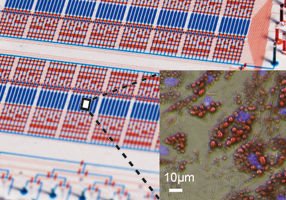Researchers develop a control algorithm for more accurate lab-on-a-chip devices
Prof. Wan Kyun Chung with PhD student Young Jin Heo, MS student Junsu Kang, and postdoctoral researcher Min Jun Kim in the Robotics Laboratory at POSTECH, Korea, have developed a novel control algorithm to resolve critical problems induced from a Proportional-Integral-Derivative (PID) controller by automatizing the technical tuning process. Their research was published in Scientific Reports.
Lab-on-a-chip designates devices that integrate various biochemical functions on a fingernail-sized chip to enable quick and compact biological analysis or medical diagnosis by processing a small volume of biological samples, such as a drop of blood. To operate various functions on a lab-on-a-chip device, the key technology is the precise and rapid manipulation of fluid on a micro-scale.
In microfluidic devices, very small and trivial variables can frequently cause a large amount of errors. Up until now, Proportional-Integral-Derivative (PID) controller has normally been used for the manipulation of fluids in microfluidic chips. To apply the PID controller, a tedious gain-tuning process is required but the gain-tuning is a difficult process for people who are unfamiliar with control theory. Especially, in the case of controlling multiple flows, the process is extremely convoluted and frustrating.
The developed control algorithm can improve accuracy and stability of flow regulation in a microfluidic network without requiring any tuning process. With this algorithm, microfluidic flows in multiple channels can be controlled in simultaneous and independent way. The team expects that this algorithm has the potential for many applications of lab-on-a-chip devices. For example, cell culture or biological analysis, which are conducted in biology laboratories, can be performed on a microfluidic chip. Physical and chemical responses can be analyzed in the subdivided levels.
Organizations
Other news from the department science

Get the life science industry in your inbox
By submitting this form you agree that LUMITOS AG will send you the newsletter(s) selected above by email. Your data will not be passed on to third parties. Your data will be stored and processed in accordance with our data protection regulations. LUMITOS may contact you by email for the purpose of advertising or market and opinion surveys. You can revoke your consent at any time without giving reasons to LUMITOS AG, Ernst-Augustin-Str. 2, 12489 Berlin, Germany or by e-mail at revoke@lumitos.com with effect for the future. In addition, each email contains a link to unsubscribe from the corresponding newsletter.




















































